DVDs Round-Up 5 | reviews, news & interviews
DVDs Round-Up 5
DVDs Round-Up 5
Gems old and new from the March line-up of DVD releases.
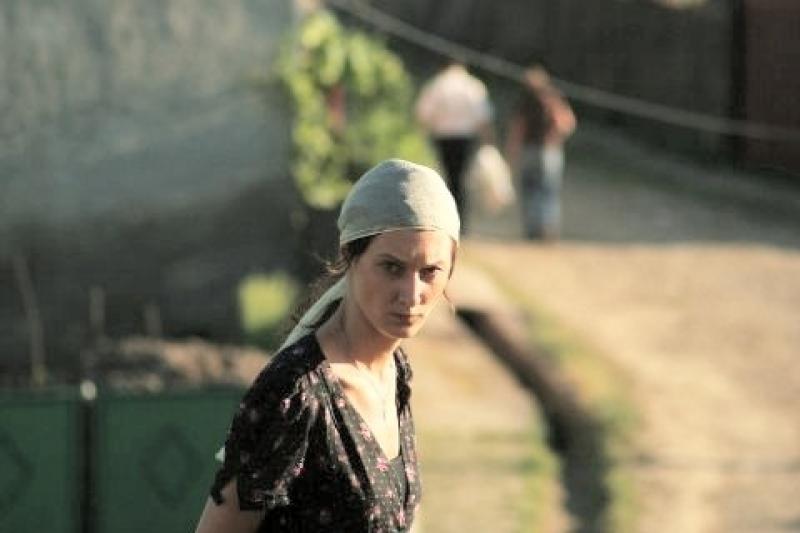
Two films with a East European flavour, Katalin Varga and Tales from the Golden Age, are among our March selection, which also includes the lovely, bittersweet Irish drama Kisses. Our US release (available worldwide, of course, by mail-order) is Wim Wenders' Paris, Texas with succulent extras. Alastair Sim stars in Guy Hamilton's 1954 film of An Inspector Calls, while the late Edward Woodward lives on in the Callan box-set.
Films we have covered previously, including Fantastic Mr Fox, Bright Star, Julie & Julia and An Education, are considered in brief, with a link to the original review. As ever, click to buy the DVDs on Amazon. This month's selection was made by Tom Birchenough, Graham Fuller, Sheila Johnston, Jasper Rees, Josh Spero, Adam Sweeting and Matt Wolf.
DVD of the Month
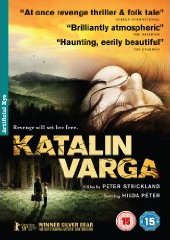 Katalin Varga, dir Peter Strickland (Artificial Eye)
Katalin Varga, dir Peter Strickland (Artificial Eye)
By Jasper Rees
How a British director came to make his debut feature with a script shot in the Carpathian Mountains using Romanian money and Hungarian dialogue is another story. The result is a tightly compacted marvel of a film which, in 82 minutes, wastes not a second of screen time in a harrowing tale of rape and revenge.
The narrative is brutally simple. A young woman is ejected from her rural village on account of some freshly discovered sexual shame. Seeming to accept her guilt, she leaves at once with her son, himself tainted in the father's eyes. As her horse-drawn odyssey drags her apparently at random across the countryside, it becomes clear that her indiscretion was involuntary. Some years ago she was raped. But this is a patriarchal society whose stern traditions have emerged as if from the mists of myth: one of them, it seems, is that a woman must suffer the consequences of her defilement. Not this heroine. By halfway through the film she has tracked down, seduced and killed the man who stood by as it happened.
Put like that, Peter Strickland’s film hardly sounds like a thing of beauty. Quite the reverse. The Carpathians through which Katalin and her son (Norbert Tankó) proceed are shot with a lyrical passion for the landscape’s forest-smothered curves. Shot in late summer when the fields are plump with unharvested grain, the trees pregnant with leaf, winds whispering gently as crickets chatter in the hot sun, Katalin Varga truly ravishes the eye. So too, it must be said, does Katalin Varga herself, beadily embodied by the sparrow-like figure of Hilda Péter. The narrative envisages her as a kind of mountain Madonna, hair tied into a headscarf of Virginal blue. It comes instantly off when she breaks the sixth commandment. In this bucolic wilderness, God is behind everything.
That this paradise is fraught with threat is visible in the winged harbingers of doom who patrol the skies – birds of prey, a lone black crane. The soundtrack broods with gloomy electronic effects. Although the film is manifestly set in the present day of police and cars and mobile phones, it occupies a grim elemental space outside the contemporary, where the laws are natural rather than civil. It’s a shock when Katalin’s horse and cart take her briefly through an ugly town's scarred high rises. “You should get yourself a car,” a peasant tells her. “And what will I do with my horse?” Good question. The past is not so easily dumped.
As for the conclusion of Katalin’s quest, she finds her rapist married to a saintly woman who accepts that their childlessness is some kind of retribution or curse. How much of a curse need not be revealed here. Victim confronts culprit, that’s for sure, while the oblivious wife listens in to Katalin’s retrieved memory of searing vaginal friction. Perhaps Strickland loses control of the reins as the story crudely gathers pace. But there’s never any doubting the text of this haunting film’s abrupt sermon. Men and women are capable of just about anything. Find Katalin Varga on Amazon.
Other Releases
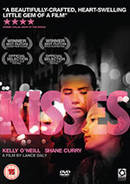 Kisses, dir. Lance Daly (Optimum Home Entertainment)
Kisses, dir. Lance Daly (Optimum Home Entertainment)
By Sheila Johnston
In outline it sounds like a straightforward genre piece, but Kisses is best described as a romantic tone poem whose slender narrative is wrapped in a veil of tantalisingly elusive moods and evocative images. It opens in grittily realist black-and-white on the outskirts of Dublin, where two kids live next door to each other on a bleak midwinter housing estate with their abusive families. After another violent argument with the lad's abusive Da, the pair set out in search of his older brother who has also long since run away. Hitching a ride into Dublin with a friendly bargee, they glide along the canal as colour bleeds into the film, so slowly at first that you think it's a fault in the print, till they arrive in the city, seemingly a magical, iridescent pleasure palace.
Armed with a stash of money that the girl has found hidden under her bed, they buy wheelies - trainers with wheels - that enable them to glide around like ghosts. It turns out that the brother has vanished in a cloud of fights and evictions and Dublin, apparently so full of possibilities, darkens into a place poised dangerously between shimmering dream and waking nightmare. The boy is named Dylan, which is the cue for a leitmotif of songs supplied by various characters including an uncredited Stephen Rea in a ludic cameo as a philosophical Dylan impersonator.
Throbbing with defiance, fear and an ache for something better, the two young actors, Shane Curry and Kelly O'Neill, are phenomenal - Daly frequently relies on simple, lingering close-ups of their faces to tell his story. Poised on the brink of adolescence, they're not really children, and certainly old beyond their years, but not quite adults either: the film hints at the mix of erotic stirrings and the yearning for tenderness that drives their relationship. The ending pulls no punches but is also not without hope. A will o' the wisp film, bittersweet and beguiling. Find Kisses on Amazon.
 The Sea Wall, dir. Rithy Panh (Axiom)
The Sea Wall, dir. Rithy Panh (Axiom)
By Jasper Rees
Marguerite Duras based the novel on which The Sea Wall is itself based on her memories of a colonial childhood in Indochina between the wars. After the death of her husband, a French widow struggles in rural isolation to tease a living out of a rice farm which every year is drowned by incoming tides. Aside from local villagers, her only company is provided by her two querulous children on the cusp of adulthood, each guiltily eager for escape, preferably to a Paris they’ve never seen. For the daughter one option will also help save her family from ruin: to accept the advances of an indigenous landowner’s son. He wears European clothes and drives a smart chauffeured car, but at 16 she cannot return his half tremulous, half seedy affections. Meanwhile, apathy and consumption eat into the mother’s store of energy and resilience. The sea wall of the title represents her last-ditch effort to hold back not just the sea but also the depredations of illness and exploitation, of death and ruin. Isabelle Huppert imbues her with a customary air of distraction and internalised agitation, while Gaspard Ulliel smoulders in the eye-candy role of the son. As Duras’s young alter-ego, the striking Astride Bergès-Frisbey portrays adolescent sexual confusion with a skilful mix of doe-eyed innocence and sly petulance. If the film doesn’t quite work it's because, despite violent monsoons and political upheaval, it feels somehow infected by the heat-sapping lethargy of the world it portrays. Find The Sea Wall on Amazon.
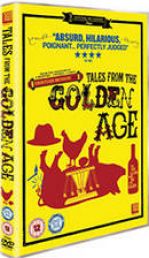 Tales from the Golden Age (Trinity)
Tales from the Golden Age (Trinity)
By Sheila Johnston
Before 4 Months, 3 Weeks and 2 Days won the Palme D'Or in Cannes in 2007 and definitively put the New Romanian Cinema on the international map, Tales from the Golden Age was a gleam in the eye of that film's director, Cristian Mungiu, who went on to write, produce and co-direct this anthology as his follow-up project. Much lighter in tone than his tough abortion drama, it's a collection of anecdotes chronicling the tragic-comic absurdities of everyday life during the last decade of Nicolae Ceauşescu's despotic rule before he was ousted in 1989.
Seven tales were shot and assembled in different combinations for release in different countries: this DVD contains the five from the original UK cinema version and a sixth is included as one of the extras. Mungiu directed only one (you'll have to guess which, since the segments are unattributed), but the overall standard is high: the other film-makers involved are Ioana Uricaru, Hanno Höfer and Constantin Popescu.
The stories are presented as "urban myths", though Mungiu insists each had its roots in a real incident. One, which bears a strong resemblance to Alan Bennett's A Private Function (1984), demonstrates just how difficult - and dangerous - it is to slaughter a pig in your flat without the neighbours finding out while another records two hapless journalists' frantic attempts to doctor a snap of the pocket dictator so as to increase his stature.
A running theme is the extraordinary ingenuity and determination deployed by people in bucking the system: a third yarn has a young couple devising an elaborate scam to get people to part with their empty bottles in order to collect the deposit, spending many hours on securing just one. All the stories are touched by a sort of perversely wistful nostalgia for a less complicated time (the term "Golden Age" was originally Ceauşescu's and one senses that its use here is not wholly ironic), and cumulatively they are a touching manifestation of how vital it is to keep laughing in the dark. Find Tales from the Golden Age on Amazon.
In Brief
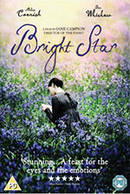 Bright Star, dir. Jane Campion (20th Century Fox Home Entertainment)
Bright Star, dir. Jane Campion (20th Century Fox Home Entertainment)
At first blush a decorous literary costume drama, Campion's account of the love affair between John Keats and Fanny Brawne offers us total immersion in a world that's both familiar and fascinating, intimate and infinitely strange. Abbie Cornish commands the film as Keats' dumpy yet luminous muse, through whose clear amber eyes the story is seen, and their relationship is portrayed as both playful and erotic. It's easier for a camel to pass through the eye of an needle than for a director to make a good film about poetry, but here Keats' sublime verse is cardinal and omnipresent. (SJ) Find Bright Star on Amazon. Read the original review on theartsdesk.
 Fantastic Mr Fox, dir. Wes Anderson (20th Century Fox Home Entertainment)
Fantastic Mr Fox, dir. Wes Anderson (20th Century Fox Home Entertainment)
Abetted by a stellar array of voice talent, including George Clooney, Meryl Streep, and Bill Murray, Anderson applies a resolutely retro design and ultra-low-tech approach to his disarming take on Roald Dahl's very British classic about a waggish renegade who gets the better of three ruthless farmers. The director's forte is a keen observation of the small oddities of human behaviour and it transfers marvellously well to the quirks of Mr F's dysfunctional vulpine family. This shaggy-fox yarn might not make for an uproarious belly-laugh movie. But it is certainly one that leaves you smiling out loud. But that's entirely as one expects from this most deadpan of humorists. (SJ) Find Fantastic Mr Fox on Amazon. Read the original review on theartsdesk. 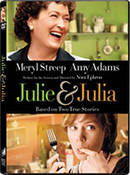 Julie & Julia, dir Nora Ephron (Sony Pictures Home Entertainment)
Julie & Julia, dir Nora Ephron (Sony Pictures Home Entertainment)
Meryl Streep continues her recent run of consummate comic performances as Julia Child, an American [chef] in Paris, in the souffle-light half of this biopic. The rock cake half is the performance of Amy Adams as the modern Julie, who cooks her way out of depression by making every recipe in Child's legendary Mastering the Art of French Cooking. While the Streep story is funny and uplifting, the Adams one is a drag, with none of the charisma or risk. Perhaps more interesting than the content of their cooking is the fact that Child and Powell are turning inside themselves: Child, after World War Two, and Powell, after 9/11, both have enough of reality and learn to explore their own interests and talents, both as a way of consuming time and a way of finding fulfilment. Watch out for Stanley Tucci as Child's husband: another quiet masterclass. (Josh Spero) Find Julie & Julia on Amazon. Read the original review on theartsdesk.
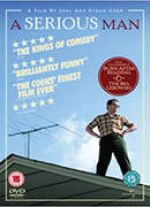 A Serious Man, dirs Ethan Coen, Joel Coen (Universal Pictures UK)
A Serious Man, dirs Ethan Coen, Joel Coen (Universal Pictures UK)
In their most personal movie yet, the brothers bring their unrivalled ear for dialogue and eye for curious, vivid details of behaviour to a milieu they know intimately: a hermetic, inward-looking all-Jewish community, anno 1967, in Minnesota where the brothers themselves grew up. Here, their Everyman hero (the tremendously good Broadway actor Michael Stuhlbarg) suffers through the trials of Job in a comedy that suggests that life might be a cruel cosmic joke. Not a feel-good movie, then (were the Coens' films ever?), but the discerning viewer will savour its singular mix of barbed humour and a satisfying seriousness of purpose. (SJ) Find A Serious Man on Amazon. Read the original review on theartsdesk.  An Education, dir Lone Scherfig (E1 Entertainment)
An Education, dir Lone Scherfig (E1 Entertainment)
London, 1961: the Beatles' first LP is still two years away, and so is sexual intercourse, but not for Jenny, a skittish 16-year-old schoolgirl who, being a good deal more beautiful than Philip Larkin, doesn't have to wait long to lose her virginity. Based on the journalist Lynn Barber's memoir of her sentimental education at the hand of an older charmer and scripted by Nick Hornby, this soft-edged exercise in nostalgia is worth seeing for its rich array of sharply drawn characters led by Carey Mulligan, who received a deserved Oscar nomination for her sweet, smart, sexy central performance. (SJ) Find An Education on Amazon. Read the original review on theartsdesk.
US Release of the Month
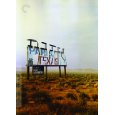 Paris, Texas, dir. Wim Wenders (Criterion)
Paris, Texas, dir. Wim Wenders (Criterion)
By Graham Fuller
An aerial shot gliding over red-streaked buttes in the Southwestern American desert picks out a man striding across the blasted terrain some miles away. He halts and the camera comes close for a montage. We see that he is middle-aged, bony and unshaven and wears a jacket, tie and red baseball cap. He drains his water bottle and a hungry hawk settles on a rock nearby. Each unforgiving twang of Ry Cooder’s slide guitar on the soundtrack signals a crisis, but the man has only a vaguely worried expression on his face. He hasn’t realised that tramping across this death valley is bringing him no closer to the woman he seeks.
Thus, the epochal opening of Wim Wenders’ Paris, Texas (1984), which has recently been issued on DVD by the Criterion Collection, following the New York company’s release of Wenders' subsequent feature, Wings of Desire (1987), last November. Both editions are the ones to own because of the high-definition digital transfers and the sumptuous extras. The most beautiful extra on the Paris, Texas double-disc set is an extended version of the silent 8mm home movie that’s shown to the protagonist, Travis (Harry Dean Stanton), after his brother Walt (Dean Stockwell) has rescued him from his amnesiacal wanderings and brought him home to suburban Los Angeles.
The home movie in the film shows Walt and his wife Anne (Aurore Clément), Travis and his estranged wife Jane (Nastassja Kinski), and their son Hunter as a three-year-old goofing around on an idyllic day at the beach. But the extended version also includes the wonderful child actor Hunter Carson, who played Hunter at seven; as important as the home movie is in inspiring the rehabilitated Travis to resume his search for Jane and to take the boy with him, the actual shooting of it was clearly a bonding session for the actors, hence Carson’s presence. Stockwell smiles, drives, and enjoys a huge stogie. Clément is all warmth. Stanton, who identified with Travis’s incommunicativeness, clearly has as much fun as the others. Kinski, effulgent and unfettered, does a perfect cartwheel, mugs for the camera, hugs Stanton and Carson, and joins Stanton and the toddler Carson in their dance on a jetty.
The DVD thus offers two temporary happy families: the one in the story that was shattered by Travis’s all-consuming possessiveness some four years before the main action, and the cast that Wenders put together to play it. The family of actors we see - Kinski joined them for just a week - is as moving to watch as the one it plays and lends to the aura of myth that surrounds Wenders’ Palme d’Or-winning road movie and his alchemical collaboration with Sam Shepard on the script.
The directors Claire Denis and Allison Anders, who respectively worked as an assistant director and a production assistant on Paris, Texas, add to this myth with their reminiscences in interviews. They tell of the shoot being imperilled by a lack of funds, of the Teamsters Union hijacking the camera truck. It was Anders, Denis says, who “tamed” Stanton. Wenders recalls in an interview how Shepard had to leave when the script was only half-written to work on a film in Wisconsin. He agreed to write the two peep show dialogues between Travis and Jane, however, and - there being no fax machines - dictated them to Wenders on the phone overnight. Kinski kept Stanton awake for 48 hours teaching him his lines for these scenes.
Wenders admits that his seven-year sojourn in the United States, much of it spent on the disappointing Hammett, would have been a failure had he never made Paris, Texas. Inspired by the mood and ambience of Shepard’s Motel Chronicles, a slim volume of poems and short stories, and specifically of “the demonic attachment of a man for his only woman”, the film is the most poetic and bitter-sweet love letter sent by a European filmmaker to the American West. (But it is a love letter, whereas Bruno Dumont’s brutal desert odyssey Twentynine Palms of 2003 is hate mail.)
Wenders says he had John Ford in mind when he was making the film but that he didn’t want to make a Fordian film. Notwithstanding this, Paris, Texas constantly engages with Ford's The Searchers, in which Ethan (John Wayne) spends years seeking his niece in the Southwest before turning away into the desert after he has restored her to friends. A similarly redemptive figure, Travis has hopes for himself, Jane, and Hunter but, like Ethan, he is doomed to live outside society.
Ford’s The Man Who Shot Liberty Valance (1962) commented bitterly on the process by which the West was turned from a wilderness into a garden. In Paris, Texas 100 years later, the gardening has amounted to faceless cities like Houston emerging from the dust. The empty lot on which Travis hoped to build a home for his family is the location of a damaged man’s pipedream, nothing more. But Wenders found a rueful beauty in the signage, neon and bright colors of motels and eateries that punctuate the desert roads; a wrecked yellow pickup truck which marks Travis and Walt's starting point one morning is a grace note. His affection for this roadside Americana is consistent with his love of his characters, which comes across in his intimate narration not just of the movie but of the priceless string of scenes, included as an extra on the DVD, that were left on the cutting-room floor. Find Paris, Texas on Amazon.
Re-release of the Month
An Inspector Calls, dir. Guy Hamilton (Optimum Home Entertainment)
By Matt Wolf
You know it from the Stephen Daldry stage revival that first opened at the National Theatre in 1992 and has gone on to become a regular part of the London (and international) dramatic landscape, having returned yet again this winter to Wyndham's Theatre. But here's a chance to compare Daldry's seismically exciting deconstructionist version of J B Priestley's play with Guy Hamilton's superb film of the same source - albeit one that is dramatically amended in structure if not purpose in Desmond Davis's screenplay.
Set in 1912 among a successful family living in morally isolationist splendour in the Midlands, Inspector works very much as a spur to conscience and a call for social awareness as well as a thriller of sorts that puts the Birling family - mum, dad, two children, and daughter's fiancé - vividly on trial. As events begin, the family has barely digested a sumptuous meal (the camera shows us a heavily laden table before we see any of those feasting at it) when an Inspector Poole (Alastair Sim) mysteriously arrives, bringing news of the death, perhaps by suicide, of a local girl called Eva Smith.
"So what?" is the initial response of a group of comfortably off swells who, in the case of daughter Sheila (Eileen Moore), seems to take a glassy-eyed view of life while mum Sybil (Olga Lindo in a role scorchingly taken on Broadway in the Daldry staging by Rosemary Harris) looks every bit as upholstered as the furniture around her. The prosperous paterfamilias, Arthur (a blustery Arthur Young), appears positively bloated by success - and too much port - while son Eric (a sweet-faced Bryan Forbes, who went on to become the much-admired film director) is "silly (and) excitable," as mentioned, as well as overcome eventually by shame. He, too, turns out to be enmeshed in the collective culpability of the Birling family for the sad fate of a less advantaged woman for whom life eventually was just too much.
How small does a town need to be to have five disparate people - the fifth participant in Eva Smith's demise turns out to be Sheila's intended, Gerald Croft - all converging on the fate of a sixth? But Priestley's point, made clear in a play that wears its Socialism with pride, is that we are all one another's keepers, and that comes through with stinging clarity even without the jewel box perched precariously on stilts with which the Daldry production (abetted by designer Ian MacNeil) turned a 1946 script into a screed against Thatcherism.
It's too bad that the film turns the play's aptly named Inspector Goole into the none-too-resonant Poole (why, one wonders?), but the great Scottish actor, Sim, is marvellous in the role, his smile seeming to contain within it all manner of accusations. As for the ending, well, it packs a singularly Priestley-esque punch: society, clearly, begins at home. Find An Inspector Calls on Amazon
Other Re-releases
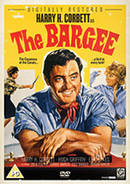 The Bargee, dir. Duncan Wood (Optimum Home Entertainment)
The Bargee, dir. Duncan Wood (Optimum Home Entertainment)
By Sheila Johnston
Scripted by Ray Galton and Alan Simpson, the authors of two classic British television sitcoms of the Sixties, Hancock's Half Hour and Steptoe and Son, The Bargee (1964) ought by rights to be a great lost British comedy. It's not quite that: the script isn't in the same class as Tony Hancock's splendid foray into feature films, The Rebel (1960). But it offers quite a few guilty pleasures. And there's one really outstanding reason to see The Bargee: the photography of Harry Waxman, who also shot Brighton Rock and The Wicker Man. The widescreen format (Techniscope, a process similar to CinemaScope) is perfectly fitted to the theme of canals and narrow boats, and every summery, colourful, immaculately framed composition is ravishing to behold.
As the titular bargee, an Alfie of the canals who has a girl at every mooring point but chugs away pronto from any mention of the m-word, Harry H Corbett hoped to prove his chops as a versatile actor. No such luck: his inflections and timing are exactly those of Steptoe fils. The screenplay, too, is totally of its era. "We've just come back from Birmingham. Ain't seen a white girl in weeks," Corbett says near the beginning as he hits on a blonde floozy, thus contriving nimbly to be sexist, racist and Brumist in one fell swoop.
The Bargee doesn't really challenge any of his prejudices. Our canal Casanova gets a pert lockmaster's daughter in the family way, triggering extreme reprisals from her irate dad (Hugh Griffith), who threatens to blow up the lock - mid-way through, the film seems to lose interest in Corbett altogether and turns into an Ealing-style community caper. All the same, nostalgists will enjoy the phalanx of British comic talent, including Eric Sykes, Miriam Karlin and a youthful Ronnie Barker, with hair and (already) a very solid embonpoint. Derek Nimmo is priceless as a twitty doctor. Find The Bargee on Amazon.
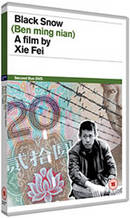 Black Snow, dir. Xie Fei (Second Run)
Black Snow, dir. Xie Fei (Second Run)
By Tom Birchenough
Twenty years after it took Berlin’s Silver Bear, Black Snow makes a very welcome return - it’s been too long for a film that caught China on the one hand still recovering from the Cultural Revolution, on the other about to grasp the realities of the culture of commerce. It's a story of urban loss of roots, of the kind that Britain’s Ken Loach would respond to immediately, with a clear sense of the rhythms, and associated difficulties, of everyday life. Hero Li Huiquan (Jiang Wen) is just out of prison – but only after a year’s sentence, so he’s no hardened criminal – and returns to his dusty room on the Beijing outskirts; it’s part of a hutong area, a cluster of single-storey dwellings of the kind now largely replaced by housing estates.
That gives him a sense of connection both to the past, and to an extended family of aunts and cousins who live up an alleyway. He’s quick enough to find a job running a street market stall, and relative prosperity; there’s no shortage either of other job offers from certain shadier acquaintances from his past, who can see that new times are going to bring new opportunities for rapid self-enrichment. But Li is essentially an innocent, a decent guy for whom values of family and friendship are more important than getting ahead.
But he’s clearly looking for more, at least on the emotional side, and a chance encounter with a budding singer starts him on a track that will end badly. That may turn the director towards a more melodramatic plot line, and away from his study of wider society, but the pessimistic conclusion has real power and resonance (the coincidence of the film’s completion in 1989 and the Tiananmen protests of the same year has been much dwelt on).
One of the most important actors of his generation (who’s since moved on to direction as well), Wen is remarkable in a part that relies on facial expression as much as words. And special credit to cinematographer Feng Xiao for catching a world of tired exterior colours and smoke-heavy interiors – as the title suggests, this is indeed the end of a long winter, and the first signs of spring are yet to come. The “eye” of both director and his DOP is immaculate.
The accompanying half-hour feature has Xie Fei talking, a little stiltedly, about his own career as one of the major figures of the so-called “fourth generation” of Chinese filmmakers. It’s galling that he hasn’t made a film now in 10 years, after excursions into the (relative) exoticism of the national cultures of Mongolia and Tibet in the 1990s. All the time he’s been teaching at the Beijing Film Academy, and history is likely to acclaim him as much for his role there, and influence on future generations, as on his own filmography. Find Black Snow on Amazon.
Boxset of the Month
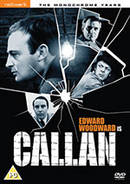 Callan: The Monochrome Years (Network DVD)
Callan: The Monochrome Years (Network DVD)
By Adam Sweeting
While Sean Connery’s James Bond became as emblematic of the Sixties as the Beatles, Michael Caine’s Harry Palmer presented the flip side of the playboy-spy boom, and spawned its own trail of dog-eared secret agents. Two years after the movie of The Ipcress File introduced Palmer as the so-called “kitchen-sink Bond”, Edward Woodward’s Callan debuted in a one-off play for ITV’s Armchair Theatre, A Magnum for Schneider. If Palmer was bolshy, working class and resentful of the supercilious Establishment figures who employed him, David Callan was a lonely depressive from some unknown existential planet. Surviving on an emotional knife-edge, his only sort-of friend a malodorous low-life called Lonely (Russell Hunter), he’d been sacked from a secret government agency called The Section, after his hitman’s expertise had been compromised by his emotional fragility. Now, The Section’s supremo Hunter wanted to summon him back from his civilian book-keeping job because “he’s a dead shot, with the cold nerve to kill.” The eponymous Schneider was the target, and was duly offed by Callan, who also neatly sidestepped the trap set for him by the cynical Hunter. The story ended with Callan quitting The Section again.
This first outing for the downbeat agent fired viewers’ imaginations sufficiently for a six-episode series to be commissioned later in 1967 for ABC. A 15-episode second series followed in 1969, broadcast on Thames Television, which ended with Death of a Hunter, in which Callan may or may not have been killed (alternative endings were shot, to be used depending on whether another series was commissioned). A third series did indeed materialise in 1970 and a fourth in 1972, but they were in colour. The four discs contained in The Monochrome Years thus round up the 1960s Callan, as far as is possible. Thanks to TV’s shockingly cavalier treatment of what was only belatedly recognised to be classic material, only two episodes survive from the first series, and nine from series two, including Death of a Hunter. All those plus A Magnum for Schneider make up the set.
Despite its age and some technical glitches which have resisted technological airbrushing, the black and white Callan still impresses with the quality of its acting (the likes of Anthony Valentine and Peter Bowles lent tone in the early days) and the unsentimental starkness of the writing by Callan’s creator James Mitchell, John Kershaw, Ray Jenkins and others. A very capable squad of directors including Piers Haggard, Toby Robertson and Peter Duguid learned to make a virtue of low-budget necessity, and the bleak, down-at-heel sets, matched with the unfriendly texture of early videotape, ensure that Callan is never comfortable viewing. It’s a great shame that Woodward’s death last November means he wasn’t able to see these early Callans on DVD. His performances are frequently astonishing, as he fires off method-like waves of angst and neurotic intensity. James Bond’s double-o prefix is an aspirational mark of status, but for Callan killing is just a grubby, menial task, like cleaning lavatories or emptying the trash. The spying game never looked so down and dirty. Find Callan: The Monochrome Years on Amazon
Stinker of the Month
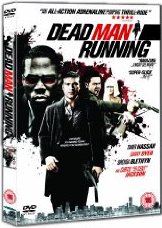 Dead Man Running, dir. Alex De Rakoff (Revolver Entertainment)
Dead Man Running, dir. Alex De Rakoff (Revolver Entertainment)
By Jasper Rees
Though your eyes may deceive you, Dead Man Running is not in fact the long unawaited sequel to Dead Man Walking, featuring the risen ghost of Sean Penn’s executed murderer. No, this is the film which quietly, modestly slipped into the public sphere with the names of two first-time producers attached. Messrs Rio Ferdinand and Ashley Cole have both been evidently casting around for new ways to fist money down the toilet. While the rest of the nation fondly dreams that the pair of them will be holding aloft an award later this year, we can safely assume that it won’t be Best Film.
Dead Man Running isn’t truly terrible. It’s just truly derivative. Even the director’s name hints as much. Mr De Rakoff has raked off plot stylings and dialogue tropes from every East End film you've ever seen. There was a spate of them a few years back, and it’s as if they’ve all met for a reunion in a yarn about a dodgy geezer currently on the straight and narrow who suddenly has to come up with 100 grand for an American loan shark or his luvly ole mum gets it. Do insert your own alternative Cockney locutions from here on in.
It’s sort of Challenge Anneka with additional vowel-mangling. There’s a roster of clichés to check off against the ticklist. Bare-knuckle boxing, greyhound nobbling, drug-pushing, black cab hotwiring, bankjobs, hitmen, tarts, spivs, sneering at northerners and toffs. It’s all very much there. The only moment of actual invention is in the joke that Nick's day job isn’t paying: he runs an agency selling ski holidays in the Middle East. Ha ha very funny except that, as any fool know, you can in fact ski in Dubai. There are actually some dependable actors sprinkled around the edges, including Brenda Blethyn and Phil Davis as the wheelchair-bound mum and the hitman who’s come to babysit her. But for most of the film we are thrust into the company of Tamer Hassan and Danny Dyer. Hassan has a face of reinforced concrete, which is handier in some scenes than in others. As his Sancho Panza, Dyer sort of sends himself up. 50 Cent, who plays the loan shark, should think about sticking to the day job. Find Dead Man Running on Amazon
Add comment
The future of Arts Journalism
You can stop theartsdesk.com closing!
We urgently need financing to survive. Our fundraising drive has thus far raised £49,000 but we need to reach £100,000 or we will be forced to close. Please contribute here: https://gofund.me/c3f6033d
And if you can forward this information to anyone who might assist, we’d be grateful.

Subscribe to theartsdesk.com
Thank you for continuing to read our work on theartsdesk.com. For unlimited access to every article in its entirety, including our archive of more than 15,000 pieces, we're asking for £5 per month or £40 per year. We feel it's a very good deal, and hope you do too.
To take a subscription now simply click here.
And if you're looking for that extra gift for a friend or family member, why not treat them to a theartsdesk.com gift subscription?
more Film
 Can I get a Witness? review - time to die before you get old
Ann Marie Fleming directs Sandra Oh in dystopian fantasy that fails to ignite
Can I get a Witness? review - time to die before you get old
Ann Marie Fleming directs Sandra Oh in dystopian fantasy that fails to ignite
 Happyend review - the kids are never alright
In this futuristic blackboard jungle everything is a bit too manicured
Happyend review - the kids are never alright
In this futuristic blackboard jungle everything is a bit too manicured
 Robert Redford (1936-2025)
The star was more admired within the screen trade than by the critics
Robert Redford (1936-2025)
The star was more admired within the screen trade than by the critics
 Blu-ray: The Sons of Great Bear
DEFA's first 'Red Western': a revisionist take on colonial expansion
Blu-ray: The Sons of Great Bear
DEFA's first 'Red Western': a revisionist take on colonial expansion
 Spinal Tap II: The End Continues review - comedy rock band fails to revive past glories
Belated satirical sequel runs out of gas
Spinal Tap II: The End Continues review - comedy rock band fails to revive past glories
Belated satirical sequel runs out of gas
 Downton Abbey: The Grand Finale review - an attemptedly elegiac final chapter haunted by its past
Noel Coward is a welcome visitor to the insular world of the hit series
Downton Abbey: The Grand Finale review - an attemptedly elegiac final chapter haunted by its past
Noel Coward is a welcome visitor to the insular world of the hit series
 Islands review - sunshine noir serves an ace
Sam Riley is the holiday resort tennis pro in over his head
Islands review - sunshine noir serves an ace
Sam Riley is the holiday resort tennis pro in over his head
 theartsdesk Q&A: actor Sam Riley on playing a washed-up loner in the thriller 'Islands'
The actor discusses his love of self-destructive characters and the problem with fame
theartsdesk Q&A: actor Sam Riley on playing a washed-up loner in the thriller 'Islands'
The actor discusses his love of self-destructive characters and the problem with fame
 Honey Don’t! review - film noir in the bright sun
A Coen brother with a blood-simple gumshoe caper
Honey Don’t! review - film noir in the bright sun
A Coen brother with a blood-simple gumshoe caper
 The Courageous review - Ophélia Kolb excels as a single mother on the edge
Jasmin Gordon's directorial debut features strong performances but leaves too much unexplained
The Courageous review - Ophélia Kolb excels as a single mother on the edge
Jasmin Gordon's directorial debut features strong performances but leaves too much unexplained
 Blu-ray: The Graduate
Post #MeToo, can Mike Nichols' second feature still lay claim to Classic Film status?
Blu-ray: The Graduate
Post #MeToo, can Mike Nichols' second feature still lay claim to Classic Film status?

Comments
...